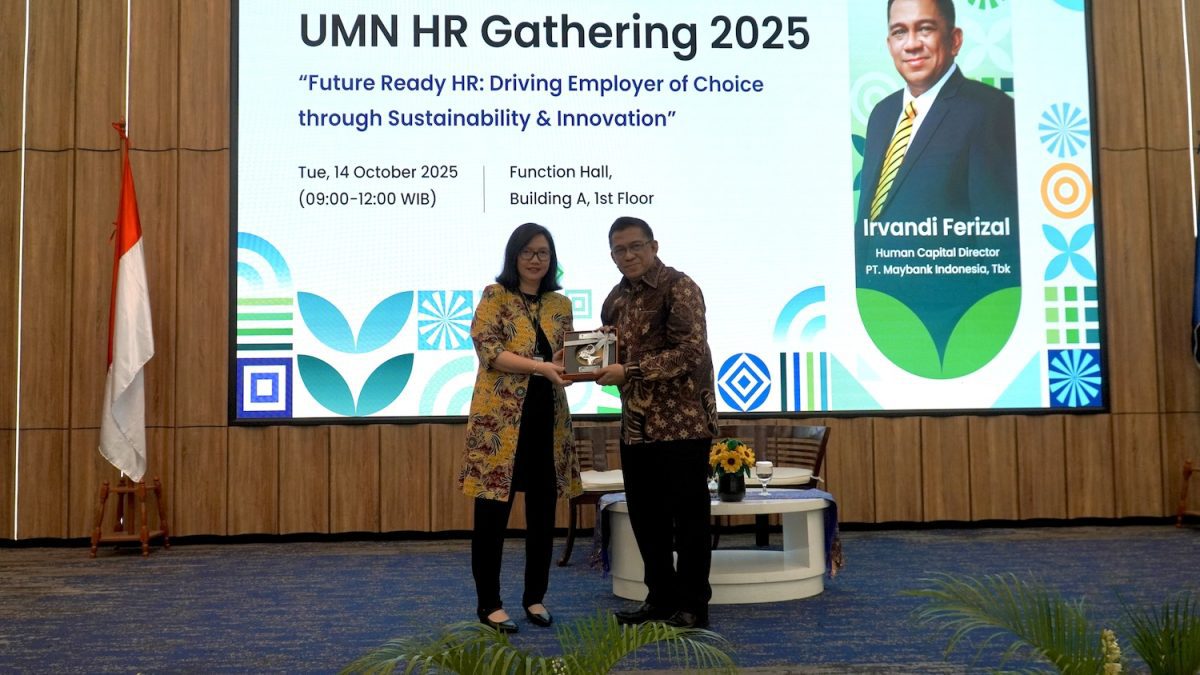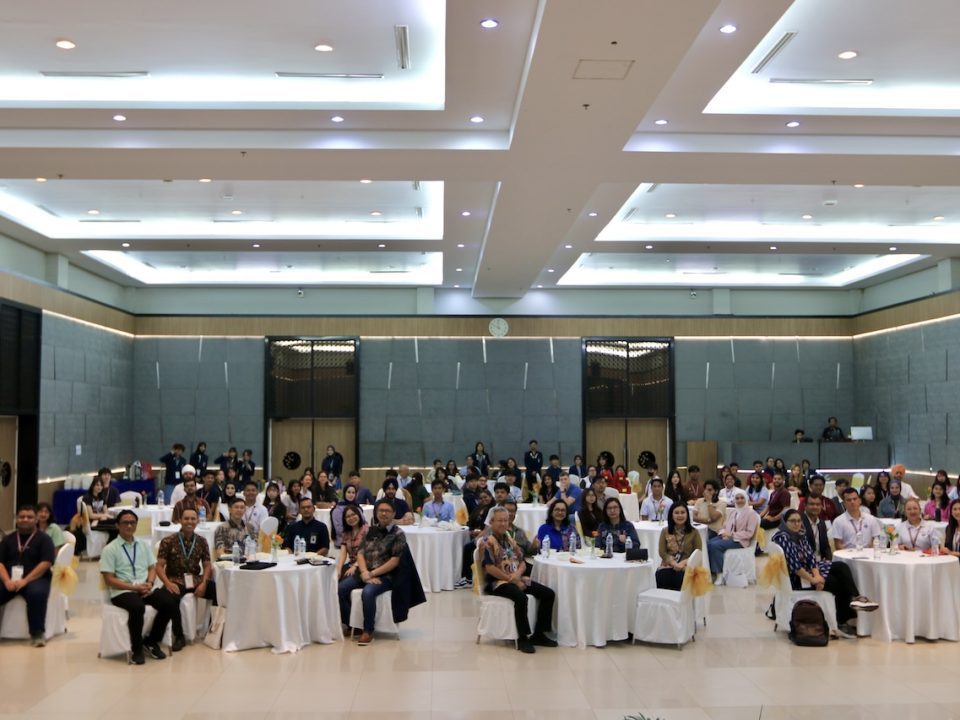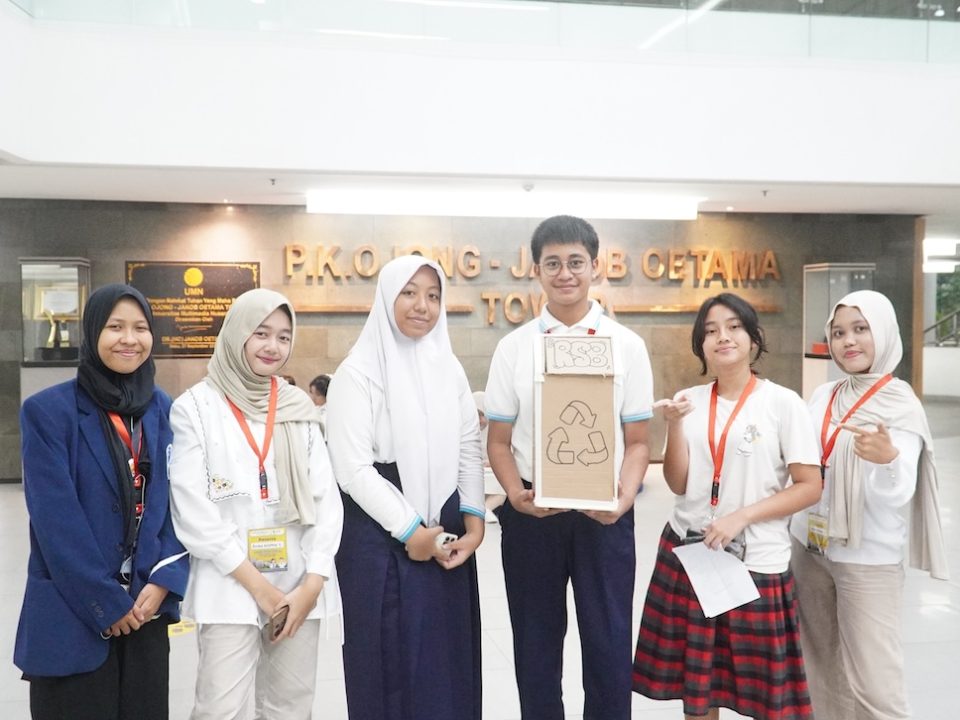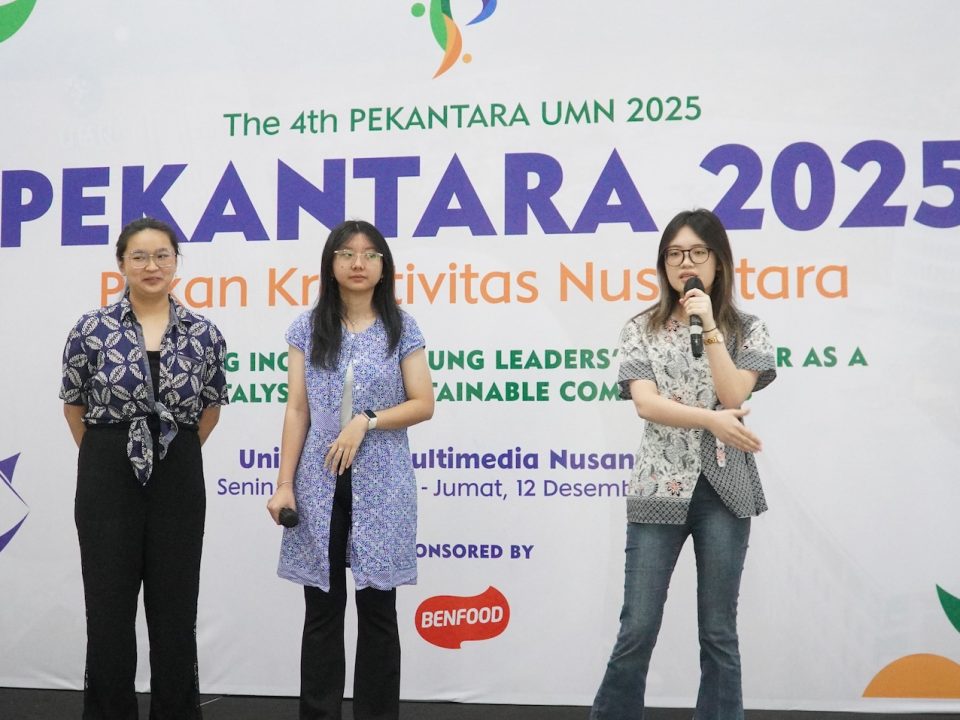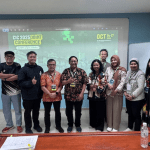
Day Two of COMNEWS 2025: Hybrid Presentation Sessions Strengthen Global Collaboration and Sustainable Communication Innovation
October 18, 2025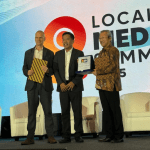
UMN Partners with Suara.com and IMS, Ready to Launch Future Digital Media Startups
October 18, 2025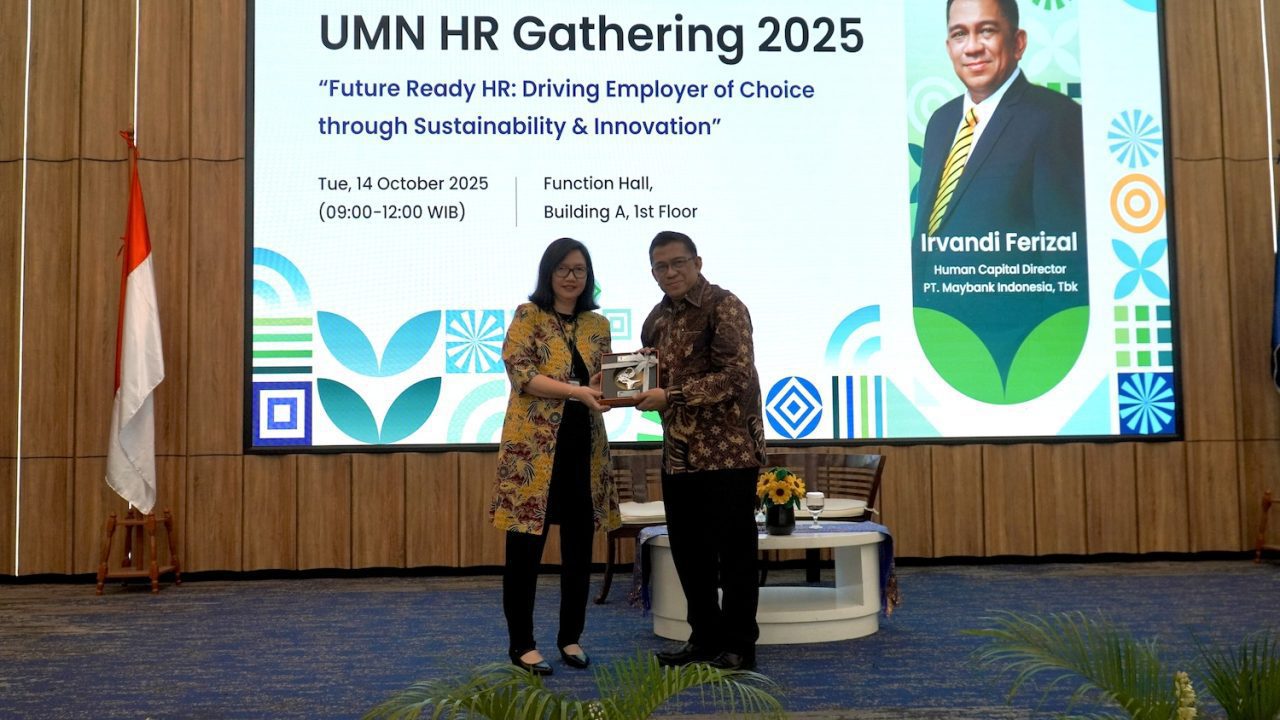
Ika presenting a plaque to Irvandi at the UMN HR Gathering 2025. (Doc. UMN)
Tangerang, (10/14/2025)—The Career Development Center (CDC) of Universitas Multimedia Nusantara held the UMN HR Gathering 2025. This event provided updates on UMN’s existing programs and was a form of appreciation from UMN to industries that have collaborated with it. The 2025 HR Gathering was also enriched with a seminar presented by Irvandi Ferizal, Human Capital Director of PT Maybank Indonesia Tbk.
The UMN HR Gathering is an annual event organized by the UMN CDC. This year, more than 90 companies that have collaborated with UMN attended the event, which carried the theme “Future Ready HR: Driving Employer of Choice Through Sustainability & Innovation.” Dr. Andrey Andoko, UMN’s Rector, opened the event online.
“Currently, global trends are very transformative and influence our lives, driven by Artificial Intelligence (AI), Big Data, and Automation, which are changing how we live, work, and learn. Data from Google shows that by 2030, 86% predict AI will fundamentally change how companies operate, with the main obstacle being a shortage of skilled workers in the AI field. Of course, AI won’t replace humans, but its role will shift from being a tool to co-existence, where AI will work alongside humans,” Andrey said.
With this data, Andrey himself has prepared learning programs at UMN that not only focus on technical skills but also foster human skills, ranging from critical and analytical thinking, creativity, innovation, problem-solving skills, resilience, agility, and empathy. For Andrey, amid the growth of AI, UMN needs to foster skills beyond AI.
“In addition to transformative technological developments, climate change is a major challenge for us. The way to overcome this is by investing in a green economy, starting with renewable energy and applying the principles of reduce, reuse, recycle. This is what is important at UMN, by implementing the Sustainable Development Goals (SDGs) in learning, research, student activities, and campus operations,” Andrey added.
Andrey also added that UMN prepares graduates who are ready to work and face the future with AI and green skills. It is hoped that by providing good learning for students, they will be able to meet industry needs and become lifelong learners.
“This activity is expected to strengthen the relationship between UMN and its industry partners. It is hoped that all the collaborations can bring good results for both parties. UMN’s good relationship with industry is proven by UMN’s achievement in the QS Rank, with 5 stars in the field of Employability. This achievement is certainly supported by existing industries,” Dr. Ika Yanuarti, S.E., M.S.F, CSA., UMN Vice Rector for Student Affairs, said.
For Ika, industry plays a significant role in higher education, not only as a place for alumni to be absorbed into the industry, but also as a strategy for UMN to continue to improve the quality of education in line with industry needs. Ika realizes that a high GPA alone is not enough for UMN graduates, but that soft skills and hard skills must also be equipped to students.
“One of our new programs, which is quite popular with companies, is curriculum matching. UMN and the industry can provide input regarding the UMN curriculum so that it is in line with the industry. With this program, the industry does not need to spend time on training because students already receive training and knowledge from the existing curriculum during their studies. After graduating, students can immediately work in their respective industries, or a ‘golden ticket,’” Ika explained.
On this occasion, Ika also outlined various collaboration opportunities that UMN can pursue with industry, including guest lectures, career days, career mentoring, campus hiring, and other collaborations open to industry.
UMN HR Gathering Seminar 2025 with Irvandi Ferizal
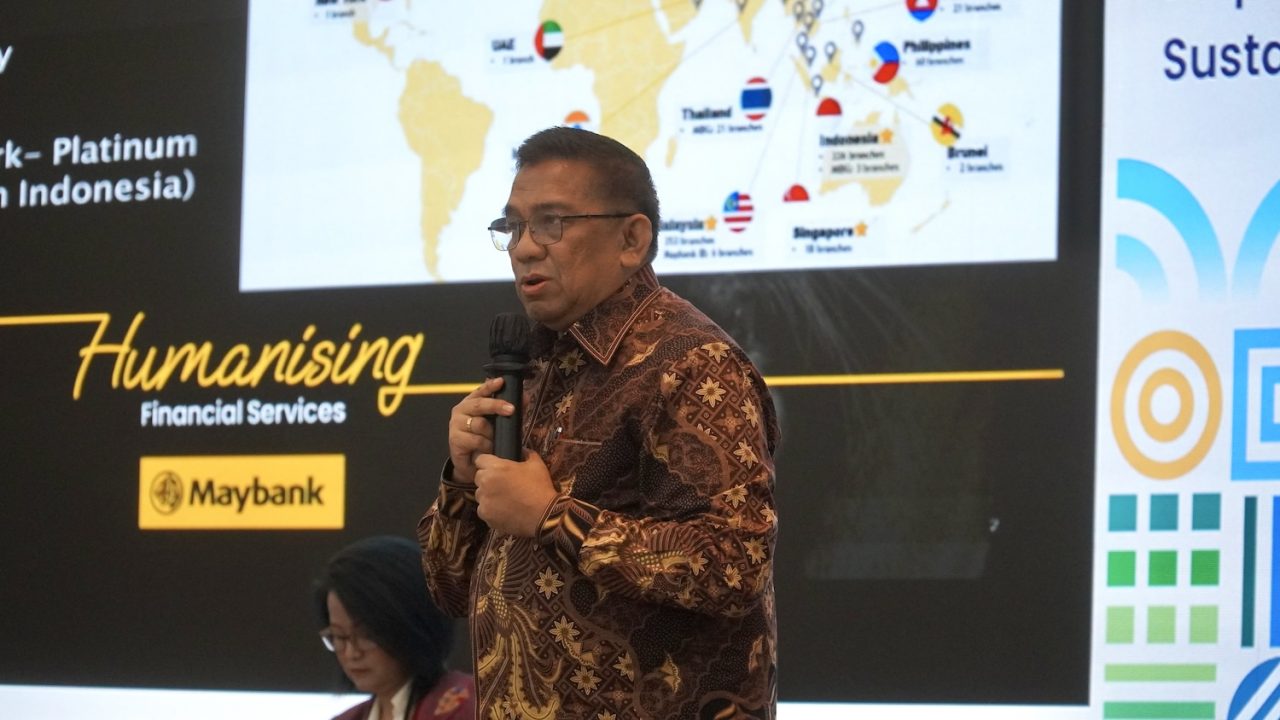
The UMN 2025 HR Gathering Seminar was presented by Irvandi. (Doc. UMN)
The world continues to evolve and change, and the job landscape is also changing due to technology and new generations entering the industry. On this occasion, Irvandi shared how Human Capital can keep up with these developments through sustainable development.
“As human capital, we cannot continue to use old concepts. We can see that Generation Z has entered the workforce, and their characteristics differ from ours. As human capital, we must have new working methods and a ‘workplace’ that keeps up with these developments. The workplace also includes new work structures and ways of working,” Irvandi explained.
For Irvandi, mental health is an important part of this due to Generation Z’s increased awareness. This is also important for Human Capital to pay attention to because work and mental health must be balanced. Irvani explained various new ways and concepts to balance this in the workplace.
“To create concepts relevant to the new generation today, we cannot demand continuous productivity growth without providing them with new experiences. These new experiences must also be wrapped up in synergy and collaboration. The industry can collaborate with various parties, and this is important. As Maybank has done, we collaborate a lot with UMN,” Irvandi continued.
Irvandi emphasized that good human capital must create good practices and be able to follow other industries with good modifications. The most important thing for Irvandi is how existing programs have marketability and communicate this to employees, because for Irvandi, various Human Capital programs are often invisible. Of course, we should provide programs that have a good impact and are helpful for employees.
“Additionally, we in Human Capital also feel the advancement of technology. Currently, we are familiar with AI, which can greatly assist companies in analyzing existing company data and revealing employee data algorithms. This is an innovation that can be implemented by human capital. However, we must also pay attention to cybersecurity, which can endanger company security,” Irvandi explained.
Irvandi also emphasized that human capital professionals should never be complacent and always be willing to learn. Learning new things does not have to be done by older employees teaching younger ones; reverse mentoring can also be done, so that employees can learn many new things together, both soft and hard skills.
By Rachel Tiffany | UMN News Service
English translation by Levina Chrestella Theodora
Kuliah di Jakarta untuk jurusan program studi Informatika| Sistem Informasi | Teknik Komputer | Teknik Elektro | Teknik Fisika | Akuntansi | Manajemen| Komunikasi Strategis | Jurnalistik | Desain Komunikasi Visual | Film dan Animasi | Arsitektur | D3 Perhotelan , di Universitas Multimedia Nusantara.

